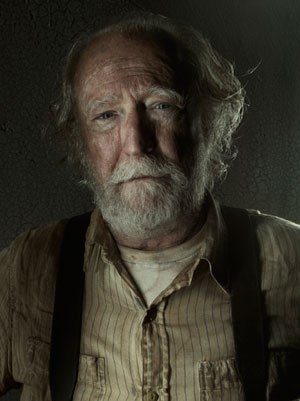
In 1961, nineteen-year-old Scott Wilson spent three days hitchhiking from Georgia to Hollywood to break into acting. But he had to fly back to his home state fifty years later to become a star.
After a career spanning six decades and more than sixty feature films, including gritty classics like In the Heat of the Night and In Cold Blood, it’s Wilson’s recent turn as veterinarian/patriarch Dr. Hershel Greene on TV smash The Walking Dead (season four premieres October 13 at 9 p.m. on AMC) that’s drawing double takes from both the costumed fantasy-con crowd and plainclothes viewers.
The seventy-one-year-old veteran actor laughs at the thought that the promise of fame was what drew him to join the cast of the basic-cable zombie show during its second season. Wilson says the quality of the acting and writing and the production value of the show caught his eye.
The job has also enabled Wilson to revisit his native Atlanta and Thomasville, where he grew up, during lulls in the months-long filming schedule. “As soon as I get off the plane in Atlanta, I can smell the earth,” Wilson says. “It goes back to my childhood. I’m connected with this place—it’s very basic.” While here, he visits his mother, who still lives in Thomasville, and he hangs out with friends he’s known since he was three or four years old, now helping the show’s fanbase skew into AARP territory. He marvels at how much Atlanta has grown, especially its recent emergence as a national film and TV production hub.
While Wilson says TWD isn’t his last role, he is savoring his part in the serial drama’s success—a feeling not to be taken for granted in a series in which characters face death every week. (Hershel has already lost his wife and a leg.) When asked why he thinks the show’s popularity has transcended the comic-geek crowd, he points at the realism beneath all the zombie makeup, the same basic human questions that made his early films, also centered around terrible, life-altering events, endure. “You have an apocalypse,” he says. “What do you do? How do you behave? How do you treat your fellow man?”
This article originally appeared in our October 2013 issue.
















